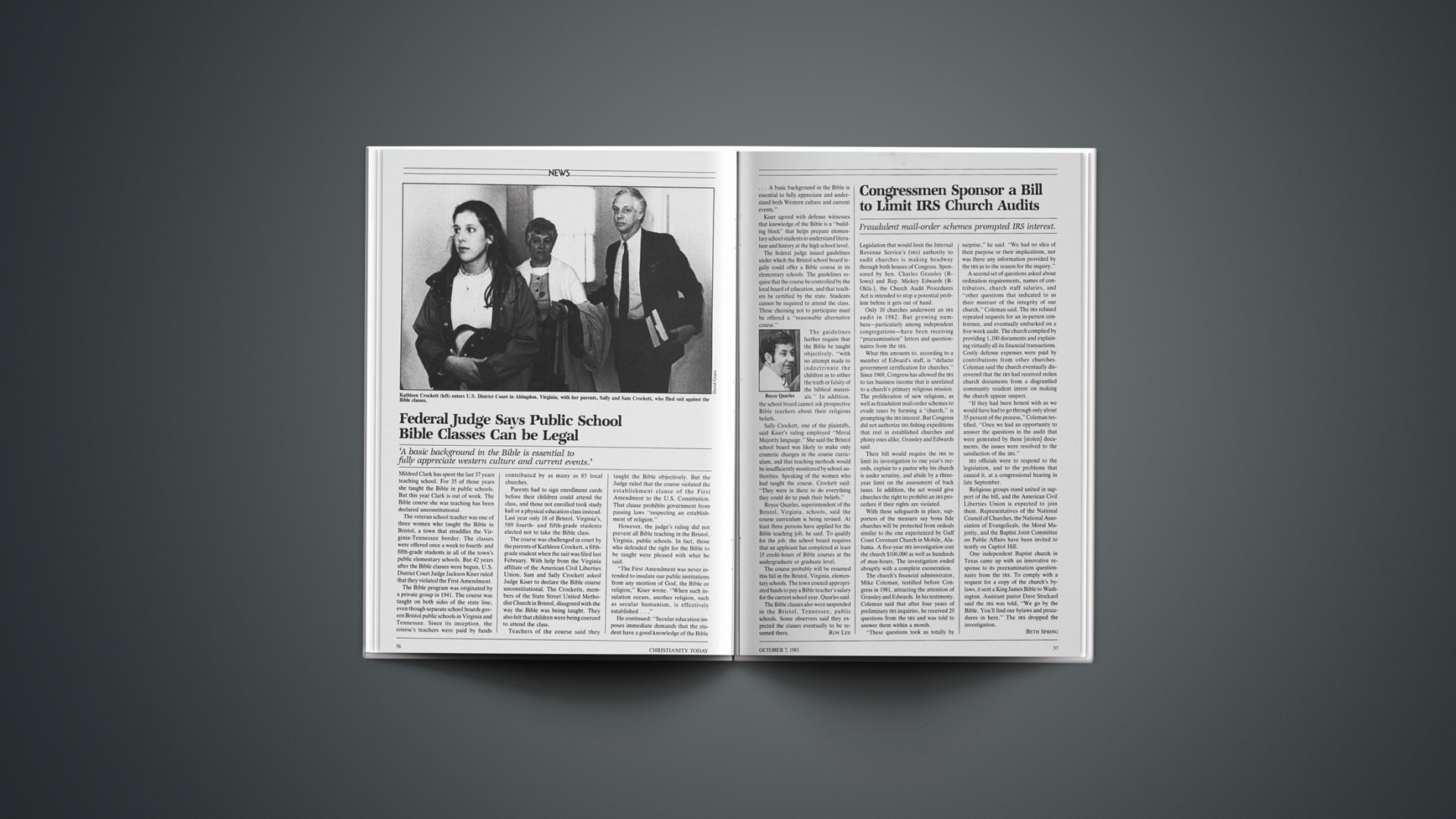‘A basic background in the Bible is essential to fully appreciate western culture and current events.’
Mildred Clark has spent the last 37 years teaching school. For 35 of those years she taught the Bible in public schools. But this year Clark is out of work. The Bible course she was teaching has been declared unconstitutional.
The veteran school teacher was one of three women who taught the Bible in Bristol, a town that straddles the Virginia-Tennessee border. The classes were offered once a week to fourth- and fifth-grade students in all of the town’s public elementary schools. But 42 years after the Bible classes were begun, U.S. District Court Judge Jackson Kiser ruled that they violated the First Amendment.
The Bible program was originated by a private group in 1941. The course was taught on both sides of the state line, even though separate school boards govern Bristol public schools in Virginia and Tennessee. Since its inception, the course’s teachers were paid by funds contributed by as many as 85 local churches.
Parents had to sign enrollment cards before their children could attend the class, and those not enrolled took study hall or a physical education class instead. Last year only 18 of Bristol, Virginia’s, 589 fourth- and fifth-grade students elected not to take the Bible class.
The course was challenged in court by the parents of Kathleen Crockett, a fifth-grade student when the suit was filed last February. With help from the Virginia affiliate of the American Civil Liberties Union, Sam and Sally Crockett asked Judge Kiser to declare the Bible course unconstitutional. The Crocketts, members of the State Street United Methodist Church in Bristol, disagreed with the way the Bible was being taught. They also felt that children were being coerced to attend the class.
Teachers of the course said they taught the Bible objectively. But the Judge ruled that the course violated the establishment clause of the First Amendment to the U.S. Constitution. That clause prohibits government from passing laws “respecting an establishment of religion.”
However, the judge’s ruling did not prevent all Bible teaching in the Bristol, Virginia, public schools. In fact, those who defended the right for the Bible to be taught were pleased with what he said.
“The First Amendment was never intended to insulate our public institutions from any mention of God, the Bible or religion,” Kiser wrote. “When such insulation occurs, another religion, such as secular humanism, is effectively established …”
He continued: “Secular education imposes immediate demands that the student have a good knowledge of the Bible … A basic background in the Bible is essential to fully appreciate and understand both Western culture and current events.”
Kiser agreed with defense witnesses that knowledge of the Bible is a “building block” that helps prepare elementary school students to understand literature and history at the high school level.
The federal judge issued guidelines under which the Bristol school board legally could offer a Bible course in its elementary schools. The guidelines require that the course be controlled by the local board of education, and that teachers be certified by the state. Students cannot be required to attend the class. Those choosing not to participate must be offered a “reasonable alternative course.”
The guidelines further require that the Bible be taught objectively, “with no attempt made to indoctrinate the children as to either the truth or falsity of the biblical materials.” In addition, the school board cannot ask prospective Bible teachers about their religious beliefs.
Sally Crockett, one of the plaintiffs, said Kiser’s ruling employed “Moral Majority language.” She said the Bristol school board was likely to make only cosmetic changes in the course curriculum, and that teaching methods would be insufficiently monitored by school authorities. Speaking of the women who had taught the course, Crockett said: “They were in there to do everything they could do to push their beliefs.”
Royce Quarles, superintendent of the Bristol, Virginia, schools, said the course curriculum is being revised. At least three persons have applied for the Bible teaching job, he said. To qualify for the job, the school board requires that an applicant has completed at least 15 credit-hours of Bible courses at the undergraduate or graduate level.
The course probably will be resumed this fall in the Bristol, Virginia, elementary schools. The town council appropriated funds to pay a Bible teacher’s salary for the current school year, Quarles said.
The Bible classes also were suspended in the Bristol, Tennessee, public schools. Some observers said they expected the classes eventually to be resumed there.










